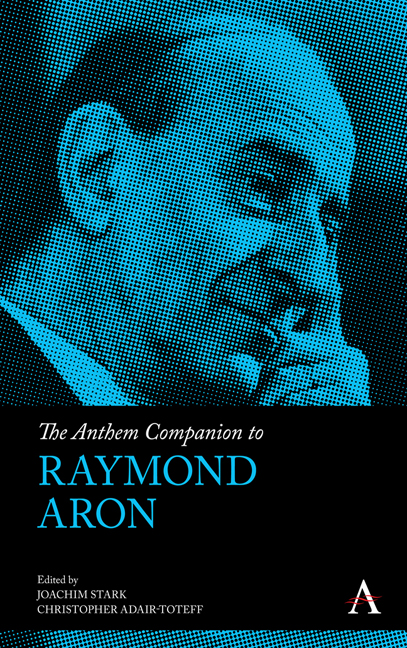Book contents
- Frontmatter
- Contents
- Acknowledgements
- Introduction: Retracing Aron’s Routes to Sociology
- Chapter One The Subject, Pluralism and Équité: Raymond Aron and Sociology
- Chapter Two Aron, Weber and Nationalism
- Chapter Three Equivocal and Inexhaustible: Aron, Marx and Marxism
- Chapter Four The Opium of the Intellectuals
- Chapter Five A New Era in the Human Adventure: Industrial Society and Economic Growth
- Chapter Six Raymond Aron: La lutte de classes
- Chapter Seven Political Philosophy Meets Political Sociology: Raymond Aron on Democracy and Totalitarianism
- Chapter Eight The Contradictions of Prometheus: Wisdom and Action after the Disillusionment of Progress
- Chapter Nine The International Problem and the Question of the Best Political Regime
- Chapter Ten War and Irrationality: Aron and Pareto
- Conclusion: Aron on Liberty
- Notes on Contributors
- Index
Chapter Nine - The International Problem and the Question of the Best Political Regime
Published online by Cambridge University Press: 22 February 2022
- Frontmatter
- Contents
- Acknowledgements
- Introduction: Retracing Aron’s Routes to Sociology
- Chapter One The Subject, Pluralism and Équité: Raymond Aron and Sociology
- Chapter Two Aron, Weber and Nationalism
- Chapter Three Equivocal and Inexhaustible: Aron, Marx and Marxism
- Chapter Four The Opium of the Intellectuals
- Chapter Five A New Era in the Human Adventure: Industrial Society and Economic Growth
- Chapter Six Raymond Aron: La lutte de classes
- Chapter Seven Political Philosophy Meets Political Sociology: Raymond Aron on Democracy and Totalitarianism
- Chapter Eight The Contradictions of Prometheus: Wisdom and Action after the Disillusionment of Progress
- Chapter Nine The International Problem and the Question of the Best Political Regime
- Chapter Ten War and Irrationality: Aron and Pareto
- Conclusion: Aron on Liberty
- Notes on Contributors
- Index
Summary
Faced with the tragic events of his time, Raymond Aron has always been concerned with thinking of the action, trying to recapture the whole density of human drama, against the illusions that promised its erasure or inciting inversely to resign to it fatalistically, thus contributing to its worsening. This led him to give to the international problem a primordial scope that went beyond the sole interest in the study of international relations, in order to grasp the whole unity of the political problem and shed light on the complexity of the human problem. Aron believes that one cannot understand politics satisfactorily without thinking about international relations and vice versa. However, could Aron, by his “classical way” of approaching the political problem, be inclined to underestimate the dynamics of progress of societies and modern liberal democracies in their ability to overcome the tragic horizon which influenced his vision of the international challenge? It is by trying to understand the philosophical significance of the lessons he derived from these exceptional circumstances that he witnessed in the twentieth century that we will be able to measure the correctness of his conception of the political problem.
The Machiavellian Problem and the Question of the Best Political Regime: The Distinction between Foreign and Domestic Policies
Raymond Aron was always concerned with extracting timeless lessons on the conduct of human affairs from the careful examination of the singular crisis of his time. He thus sought to understand the deployment of the unprecedented from a permanent core which makes this possible, while questioning what these new disruptions indicate about our human condition. Recapturing the singularity of the drama of his century, following the terrible cataclysm of the First World War, following the thread of the international problem, through the chain of wars and the failure of peace between States, Aron rediscovers the Thucydides perspective highlighting the decisive importance of the question of the outside, that of the relations between independent political entities, of the alternation between peace and war without a foreseeable term, which places human societies before a necessarily uncertain and tragic horizon.
- Type
- Chapter
- Information
- The Anthem Companion to Raymond Aron , pp. 153 - 168Publisher: Anthem PressPrint publication year: 2021



